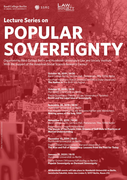Veranstaltungen
Möchten Sie diese Veranstaltung wirklich löschen?
Möchten Sie diese Veranstaltung freigeben?
Veranstaltungsreihe: Lecture Series on Popular Sovereignty
Ringvorlesung
Dieter Grimm: Popular Sovereignty as Dormant Sovereignty
Closing event of the Lecture Series on Popular Sovereignty organized by Bard College Berlin and the Integrated Research Institute Law & Society
Termine
Di., 21.01.202018:00 Uhr - 20:00 Uhr
Standort
Unter den Linden 9.Altes PalaisEintritt
frei 
Abbildung:Bard College
"Popular sovereignty" deals with the bearer of sovereignty: it is the people (as opposed to, e.g., a monarch). Yet, unlike a monarch, the people is not able to govern itself. For this, it needs representatives who govern on its behalf and according to the conditions set by it, usually in the constitution. Therefore, popular sovereignty retreats into the constituent power that is ascribed to the people. Once the constitution is in force, there are only constituted powers, no sovereign. Within the constitutional state, sovereignty is "dormant" and revives only when the existing constitution is abolished and replaced by a new one. During the existence of the constitution, it mutates to the legitimating principle of the political entity and, as such, guides the organization and exercise of political power.
Prof. em. Dr. Dr. h.c. mult. Dieter Grimm, LL.M. (Harvard) is a permanent fellow of the Wissenschaftskolleg zu Berlin and Professor emeritus for Public Law at the Humboldt-Universität zu Berlin. From 1987 to 1999 he served as justice at the Federal Constitutional Court, from 2001 to 2007 he was Rector of Wissenschaftskolleg zu Berlin. His research deals with questions surrounding the achievement of constitutionalism: the history of modern constitutionalism, constitutional theory, constitutional law - German and comparative, and constitutional adjudication, constitutionalism beyond the state (especially in the European Union, but also on the global level). He is currently writing a book on the place of Germany's constitution and of the Federal Constitutional Court and its jurisprudence in recent books on the history of the Federal Republic from the end of World War II to (and sometimes beyond) German unification.
This is the closing event of the Lecture Series on Popular Sovereignty organized by Bard College Berlin and the Law and Society Institute at Humboldt-Universität zu Berlin with the support of the American Social Science Research Council.
Prof. em. Dr. Dr. h.c. mult. Dieter Grimm, LL.M. (Harvard) is a permanent fellow of the Wissenschaftskolleg zu Berlin and Professor emeritus for Public Law at the Humboldt-Universität zu Berlin. From 1987 to 1999 he served as justice at the Federal Constitutional Court, from 2001 to 2007 he was Rector of Wissenschaftskolleg zu Berlin. His research deals with questions surrounding the achievement of constitutionalism: the history of modern constitutionalism, constitutional theory, constitutional law - German and comparative, and constitutional adjudication, constitutionalism beyond the state (especially in the European Union, but also on the global level). He is currently writing a book on the place of Germany's constitution and of the Federal Constitutional Court and its jurisprudence in recent books on the history of the Federal Republic from the end of World War II to (and sometimes beyond) German unification.
This is the closing event of the Lecture Series on Popular Sovereignty organized by Bard College Berlin and the Law and Society Institute at Humboldt-Universität zu Berlin with the support of the American Social Science Research Council.
Weitere Informationen
Veranstalter: Integrated Research Institute Law & Society, Bard College Berlin
Referenten: Dieter Grimm
Unterstützt von: American Social Science Research Council
Leitung: Anna-Bettina Kaiser, Ewa Atanassow
Kontakt
Valentin Feneberg
Telefon: 030 2093-3534
valentin.feneberg@rewi.hu-berlin.de
Adresse
Unter den Linden 9.Altes Palais
Raum: 213
Weitere Termine der Reihe
- 10.10.2019-21.01.2020: Vorlesungsreihe: Popular Sovereignty